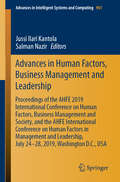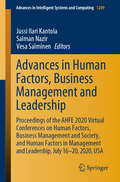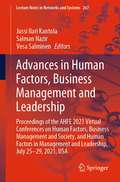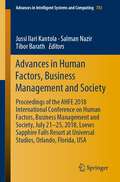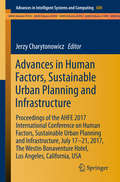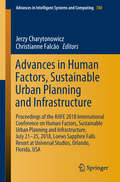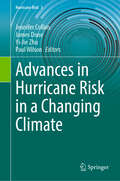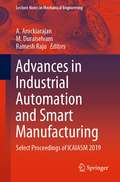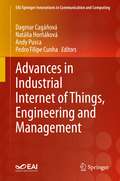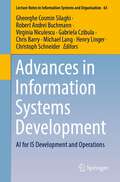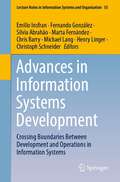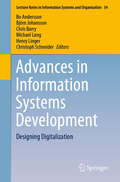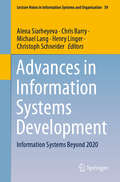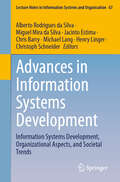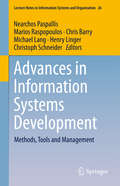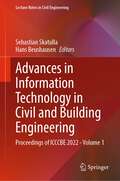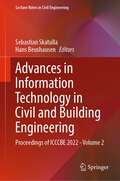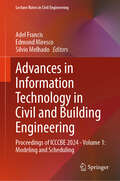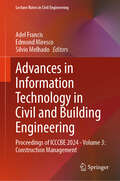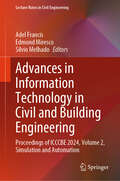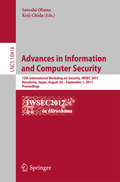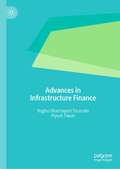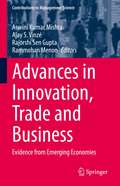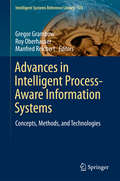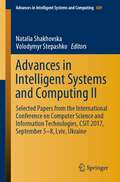- Table View
- List View
Advances in Human Factors, Business Management and Leadership: Proceedings Of The Ahfe 2017 Conference On Human Factors, Business Management And Society And The Ahfe 2017 Conference On Human Factors In Management And Leadership, July 17-21, 2017, Los Angeles, California, Usa (Advances in Intelligent Systems and Computing #594)
by Jussi Ilari Kantola Salman NazirThis book presents practical approaches for facilitating the achievement of excellence in the management and leadership of organizational resources. It shows how the principles of creating shared value can be applied to ensure faster learning, training, business development, and social renewal. In particular, it presents novel methods and tools for tackling the complexity of management and learning in both business organizations and society. Discussing ontologies, intelligent management systems, methods for creating knowledge and value added, it offers novel insights into time management and operations optimization, as well as advanced methods for evaluating customers’ satisfaction and conscious experience. Based on two conferences, the AHFE 2019 International Conference on Human Factors, Business Management and Society, and the AHFE 2019 International Conference on Human Factors in Management and Leadership, held in July 24-28, 2019, Washington D.C., USA, the book provides both researchers and professionals with new tools and inspiring ideas for achieving excellence in various business activities.
Advances in Human Factors, Business Management and Leadership: Proceedings of the AHFE 2020 Virtual Conferences on Human Factors, Business Management and Society, and Human Factors in Management and Leadership, July 16-20, 2020, USA (Advances in Intelligent Systems and Computing #1209)
by Jussi Ilari Kantola Salman Nazir Vesa SalminenThis book analyzes new theories and practical approaches for promoting excellence in human resource management and leadership. It shows how the principles of creating shared value can be applied to ensure faster learning, training, business development and social renewal. In particular, it presents novel methods and tools for tackling the complexity of management and learning in both business organizations and society. Discussing ontologies, intelligent management systems, and methods for creating knowledge and value added, it offers novel insights into time management and operations optimization, as well as advanced methods for evaluating customers’ satisfaction and conscious experience. Based on three AHFE 2020 Virtual Conferences: the AHFE 2020 Conference on Human Factors, Business Management and Society, the AHFE 2020 Conference on Human Factors in Management and Leadership, held on July 16–20, 2020, the book provides researchers and professionals with extensive information, practical tools and inspiring ideas for achieving excellence in a broad spectrum of business and societal activities.
Advances in Human Factors, Business Management and Leadership: Proceedings of the AHFE 2021 Virtual Conferences on Human Factors, Business Management and Society, and Human Factors in Management and Leadership, July 25-29, 2021, USA (Lecture Notes in Networks and Systems #267)
by Jussi Ilari Kantola Salman Nazir Vesa SalminenThis book analyzes new theories and practical approaches for promoting excellence in human resource management and leadership. It shows how the principles of creating shared value can be applied to ensure faster learning, training, business development and social renewal. In particular, it presents novel methods and tools for tackling the complexity of management and learning in both business organizations and society. Gathering the proceedings of the AHFE 2021 Conferences on Human Factors, Business Management and Society, and Human Factors in Management and Leadership, held virtually on July 25–29, 2021, from USA, this book provides researchers and professionals with extensive information, practical tools and inspiring ideas for achieving excellence in a broad spectrum of business and societal activities.
Advances in Human Factors, Business Management and Society: Proceedings of the AHFE 2018 International Conference on Human Factors, Business Management and Society, July 21-25, 2018, Loews Sapphire Falls Resort at Universal Studios, Orlando, Florida, USA (Advances in Intelligent Systems and Computing #783)
by Jussi Ilari Kantola Tibor Barath Salman NazirThis book presents practical approaches for facilitating the achievement of excellence in the management and leadership of organizational resources. It shows how the principles of creating shared value can be applied to ensure faster learning, training, business development, and social renewal. In particular, it presents novel methods and tools for tackling the complexity of management and learning in both business organizations and society. Discussing ontologies, intelligent management systems, methods for creating knowledge and value added, it offers novel insights into time management and operations optimization, as well as advanced methods for evaluating customers’ satisfaction and conscious experience. Based on two conferences, the AHFE 2018 International Conference on Human Factors, Business Management and Society, and the AHFE 2018 International Conference on Human Factors in Management and Leadership, held on July 21–25, 2018, in Orlando, Florida, USA, the book provides both researchers and professionals with new tools and inspiring ideas for achieving excellence in various business activities.
Advances in Human Factors, Sustainable Urban Planning and Infrastructure: Proceedings of the AHFE 2017 International Conference on Human Factors, Sustainable Urban Planning and Infrastructure, July 17−21, 2017, The Westin Bonaventure Hotel, Los Angeles, California, USA (Advances in Intelligent Systems and Computing #600)
by Jerzy CharytonowiczThis book deals with human factors research directed towards realizing and assessing sustainability in the built environment. It reports on advanced engineering methods for sustainable infrastructure design, as well as on assessments of the efficient methods and the social, environmental, and economic impact of various designs and projects. The book covers a range of topics, including the use of recycled materials in architecture, ergonomics in buildings and public design, sustainable design for smart cities, design for the aging population, industrial design, human scale in architecture, and many more. Based on the AHFE 2017 International Conference on Human Factors, Sustainable Urban Planning and Infrastructure, held on July 17-21, 2017, in Los Angeles, California, USA, this book, by showing different perspectives on sustainability and ergonomics, represents a useful source of information for designers in general, urban engineers, architects, infrastructure professionals, practitioners, public infrastructure owners, policy makers, government engineers and planners, as well as operations managers, and academics active in applied research.
Advances in Human Factors, Sustainable Urban Planning and Infrastructure: Proceedings of the AHFE 2018 International Conference on Human Factors, Sustainable Urban Planning and Infrastructure, July 21-25, 2018, Loews Sapphire Falls Resort at Universal Studios, Orlando, Florida, USA (Advances in Intelligent Systems and Computing #788)
by Jerzy Charytonowicz Christianne FalcãoThis book discusses human factors research directed towards realizing and assessing sustainability in the built environment. It reports on advanced engineering methods for sustainable infrastructure design, as well as on assessments of the efficient methods and the social, environmental, and economic impact of various designs and projects. The book covers a range of topics, including the use of recycled materials in architecture, ergonomics in buildings and public design, sustainable design for smart cities, design for the aging population, industrial design, human scale in architecture, and many more. Based on the AHFE 2018 International Conference on Human Factors, Sustainable Urban Planning and Infrastructure, held on July 21–25, 2018, in Orlando, Florida, USA, it offers various perspectives on sustainability and ergonomics. As such, it is a valuable reference resource for designers, urban engineers, architects, infrastructure professionals, public infrastructure owners, policy makers, government engineers and planners, as well as operations managers and academics active in urban and infrastructure research.
Advances in Hurricane Risk in a Changing Climate (Hurricane Risk #3)
by Paul Wilson Jennifer Collins James Done Yi-Jie ZhuTropical cyclones (including hurricanes) are becoming more destructive. Rising seas are resulting in greater storm surge inundation. More moisture-laden, warmer air is leading to heavier rains. There is also mounting evidence for more powerful winds and a greater incidence of the strongest storms. Do we fully understand these changes, and what will these changes mean for society? Arising from the 2024 Symposium on Hurricane Risk in a Changing Climate, this book contains new research on hurricane behavior, our vulnerability, and how we communicate the risk. This book is essential reading to understand the future of tropical cyclone risk and what it means for society.
Advances in Industrial Automation and Smart Manufacturing: Select Proceedings of ICAIASM 2019 (Lecture Notes in Mechanical Engineering)
by A. Arockiarajan M. Duraiselvam Ramesh RajuThis book comprises selected peer-reviewed proceedings of the International Conference on Advances in Industrial Automation and Smart Manufacturing (ICAIASM) 2019. The contents focus on innovative manufacturing processes, standards and technologies used to implement Industry 4.0, and industrial IoT based environment for smart manufacturing. The book particularly emphasizes on emerging industrial concepts like industrial IoT and cyber physical systems, advanced simulation and digital twin, wireless instrumentation, rapid prototyping and tooling, augmented reality, analytics and manufacturing operations management. Given the range of topics covered, this book will be useful for students, researchers as well as industry professionals.
Advances in Industrial Internet of Things, Engineering and Management (EAI/Springer Innovations in Communication and Computing)
by Dagmar Cagáňová Natália Horňáková Pedro Filipe Cunha Andy PuscaThis book presents the trends, challenges, and advances in Internet of Things (IoT) in the areas of industrial management and industrial engineering. The authors look at how smart environments (smart city, smart university, smart regions, smart transportation, etc.) affect the way industrial management and industrial engineering are envisioned, planned, and applied and how engineers must incorporate new ideas and methods now and in the future. Some topics include the impact of ICT on the emergency response vehicle driving time, car accident detecting systems based on machine learning algorithms, smart city platforms based on citizen reporting services, and IoT-based household energy consumption prediction using machine learning. The book brings together contributions from academics and practitioners from around the world to discuss the intersection of IoT, industry and management.
Advances in Information Systems Development: AI for IS Development and Operations (Lecture Notes in Information Systems and Organisation #63)
by Michael Lang Christoph Schneider Chris Barry Henry Linger Gheorghe Cosmin Silaghi Robert Andrei Buchmann Virginia Niculescu Gabriela CzibulaThis volume is a collection of papers on emerging concepts, significant insights, and novel approaches on information systems development (ISD). It examines and investigates up-and-coming trends in ISD in general, emphasizing benefits and risks of Artificial Intelligence in the development and operation of Information Systems. The book draws on invited papers selected from the proceedings of the 30th International Conference on Information Systems Development hosted by Babeș-Bolyai University, Cluj-Napoca, Romania, August 31 - September 2, 2022 (ISD2022). The theme of ISD2022 was “Artificial Intelligence for Information Systems Development and Operations”. The conference focused on the interplay between Information Systems and Artificial Intelligence, trying to emphasize novel, smarter automation approaches and the mitigation of risks related to AI adoption. Primary readership of the volume are researchers interested in methodological and operational perspectives related to ISD in general, and to AI adoption as a means of digital transformation in particular.
Advances in Information Systems Development: Crossing Boundaries Between Development and Operations in Information Systems (Lecture Notes in Information Systems and Organisation #55)
by Michael Lang Christoph Schneider Chris Barry Henry Linger Marta Fernández Emilio Insfran Fernando González Silvia AbrahãoThis volume features a collection of papers on emerging concepts, significant insights, novel approaches and ideas in information systems development (ISD). It examines and investigates up-and-coming trends in ISD in general, emphasizing the continuous collaboration between developers and operators to optimize the software delivery time. The book gathers selected papers from the 29th International Conference on Information Systems Development held at Universitat Politècnica de València, Spain, September 8-10, 2021. The theme of ISD2021 was “Crossing Boundaries between Development and Operations (DevOps) in Information Systems.” The revised and extended papers focus on the influences among information systems, organizational structures, processes and people from its conception to its operation. They examine methodological issues and ways in which the IS designers, developers and operators are transforming organisations and society through information systems.
Advances in Information Systems Development: Designing Digitalization (Lecture Notes in Information Systems and Organisation #34)
by Michael Lang Christoph Schneider Chris Barry Henry Linger Björn Johansson Bo AnderssonThis volume features a collection of papers on emerging concepts, significant insights, novel approaches and ideas in information systems research. It examines advances in information systems development in general, and their impact on the development of new methods, tools and management. The book contains invited papers selected from the 27th International Conference on Information Systems Development (ISD) held in Lund, Sweden, August 22 - 24, 2018. The revised and expanded papers present research that focuses on methods, tools and management in information systems development. These issues are significant as they provide the basis for organizations to identify new markets, support innovative technology deployment, and enable mobile applications to detect, sense, interpret and respond to the environment.
Advances in Information Systems Development: Information Systems Beyond 2020 (Lecture Notes in Information Systems and Organisation #39)
by Michael Lang Christoph Schneider Chris Barry Henry Linger Alena SiarheyevaThis volume features a collection of papers on emerging concepts, significant insights, novel approaches and ideas in information systems development (ISD). It xamines advances in ISD in general and investigates emerging trends that will shape the ISD research agenda beyond 2020. The book gathers selected papers from the 28th International Conference on Information Systems Development held in Toulon, France on August 28-30, 2019.The revised and extended papers explore the mutual influences between information systems and organizational structures, processes and people, and promote research into methodological issues and ways in which the IS designers and developers are transforming organizations and society through information systems.Chapter "Smart Grid Challenges through the lens of the European General Data Protection Regulation" is available open access under a Creative Commons Attribution 4.0 International License via link.springer.com
Advances in Information Systems Development: Information Systems Development, Organizational Aspects, and Societal Trends (Lecture Notes in Information Systems and Organisation #67)
by Michael Lang Christoph Schneider Chris Barry Henry Linger Alberto Rodrigues da Silva Miguel Mira da Silva Jacinto EstimaThis volume is a collection of papers on emerging concepts, significant insights, and novel approaches to Information Systems Development (ISD). It delves into the latest trends in ISD and examines how organizational goals, structure, and the business environment--including regulations and societal trends--can impact the creation and implementation of information systems. The book draws on invited papers selected from the proceedings of the 31st International Conference on Information Systems Development hosted by Instituto Superior Técnico, Lisbon, Portugal, on August 30-September 1, 2023 (ISD2023).The general theme of ISD2023 was "Information Systems Development, Organizational Aspects, and Societal Trends". This volume is specifically designed for researchers who are interested in exploring the methodological and operational perspectives of Information Systems Development, as well as the impact of organizational aspects and societal trends.The primary target audience for this volume is those who want to deepen their understanding of ISD from both theoretical and practical perspectives.
Advances in Information Systems Development: Methods, Tools And Management (Lecture Notes in Information Systems and Organisation #26)
by Michael Lang Christoph Schneider Chris Barry Henry Linger Nearchos Paspallis Marios RaspopoulosThis volume features a collection of papers on emerging concepts, significant insights, novel approaches and ideas in information systems development. It examines advances in information systems development in general, and their impact on the development of new methods, tools and management. <P><P> The book draws on selected invited papers from the 26th International Conference on Information Systems Development (ISD) held in Larnaca, Cyprus, September 6 - 8, 2017. The revised and expanded papers present research that focuses on methods, tools and management in information systems development. These issues are significant as they provide the basis for organizations to identify new markets, support innovative technology deployment, and enable mobile applications to detect, sense, interpret and respond to the environment.
Advances in Information Technology in Civil and Building Engineering: Proceedings of ICCCBE 2022 - Volume 1 (Lecture Notes in Civil Engineering #357)
by Hans Beushausen Sebastian SkatullaThis book gathers the latest advances, innovations, and applications in the field of information technology in civil and building engineering, presented at the 19th International Conference on Computing in Civil and Building Engineering (ICCCBE), held in Cape Town, South Africa on October 26-28, 2022. It covers highly diverse topics such as BIM, construction information modeling, knowledge management, GIS, GPS, laser scanning, sensors, monitoring, VR/AR, computer-aided construction, product and process modeling, big data and IoT, cooperative design, mobile computing, simulation, structural health monitoring, computer-aided structural control and analysis, ICT in geotechnical engineering, computational mechanics, asset management, maintenance, urban planning, facility management, and smart cities. Written by leading researchers and engineers, and selected by means of a rigorous international peer-review process, the contributions highlight numerous exciting ideas that will spur novel research directions and foster multidisciplinary collaborations.
Advances in Information Technology in Civil and Building Engineering: Proceedings of ICCCBE 2022 - Volume 2 (Lecture Notes in Civil Engineering #358)
by Hans Beushausen Sebastian SkatullaThis book gathers the latest advances, innovations, and applications in the field of information technology in civil and building engineering, presented at the 19th International Conference on Computing in Civil and Building Engineering (ICCCBE), held in Cape Town, South Africa on October 26-28, 2022. It covers highly diverse topics such as BIM, construction information modeling, knowledge management, GIS, GPS, laser scanning, sensors, monitoring, VR/AR, computer-aided construction, product and process modeling, big data and IoT, cooperative design, mobile computing, simulation, structural health monitoring, computer-aided structural control and analysis, ICT in geotechnical engineering, computational mechanics, asset management, maintenance, urban planning, facility management, and smart cities. Written by leading researchers and engineers, and selected by means of a rigorous international peer-review process, the contributions highlight numerous exciting ideas that will spur novel research directions and foster multidisciplinary collaborations.
Advances in Information Technology in Civil and Building Engineering: Proceedings of ICCCBE 2024 - Volume 1: Modeling and Scheduling (Lecture Notes in Civil Engineering #628)
by Silvio Melhado Adel Francis Edmond MirescoThis book gathers the latest advances, innovations, and applications in the field of information technology in civil and building engineering, presented at the 20th International Conference on Computing in Civil and Building Engineering (ICCCBE), held in Montreal, Canada on August 25-28, 2024. It covers highly diverse topics such as BIM, construction information modeling, knowledge management, GIS, GPS, laser scanning, sensors, monitoring, VR/AR, computer-aided construction, product and process modeling, big data and IoT, cooperative design, mobile computing, simulation, structural health monitoring, computer-aided structural control and analysis, ICT in geotechnical engineering, computational mechanics, asset management, maintenance, urban planning, facility management, and smart cities. Written by leading researchers and engineers, and selected by means of a rigorous international peer-review process, the contributions highlight numerous exciting ideas that will spur novel research directions and foster multidisciplinary collaborations.
Advances in Information Technology in Civil and Building Engineering: Proceedings of ICCCBE 2024 - Volume 3: Construction Management (Lecture Notes in Civil Engineering #630)
by Silvio Melhado Adel Francis Edmond MirescoThis book gathers the latest advances, innovations, and applications in the field of information technology in civil and building engineering, presented at the 20th International Conference on Computing in Civil and Building Engineering (ICCCBE), held in Montreal, Canada on August 25-28, 2024. It covers highly diverse topics such as BIM, construction information modeling, knowledge management, GIS, GPS, laser scanning, sensors, monitoring, VR/AR, computer-aided construction, product and process modeling, big data and IoT, cooperative design, mobile computing, simulation, structural health monitoring, computer-aided structural control and analysis, ICT in geotechnical engineering, computational mechanics, asset management, maintenance, urban planning, facility management, and smart cities. Written by leading researchers and engineers, and selected by means of a rigorous international peer-review process, the contributions highlight numerous exciting ideas that will spur novel research directions and foster multidisciplinary collaborations.
Advances in Information Technology in Civil and Building Engineering: Proceedings of ICCCBE 2024, Volume 2, Simulation and Automation (Lecture Notes in Civil Engineering #629)
by Silvio Melhado Adel Francis Edmond MirescoThis book gathers the latest advances, innovations, and applications in the field of information technology in civil and building engineering, presented at the 20th International Conference on Computing in Civil and Building Engineering (ICCCBE), held in Montreal, Canada on August 25-28, 2024. It covers highly diverse topics such as BIM, construction information modeling, knowledge management, GIS, GPS, laser scanning, sensors, monitoring, VR/AR, computer-aided construction, product and process modeling, big data and IoT, cooperative design, mobile computing, simulation, structural health monitoring, computer-aided structural control and analysis, ICT in geotechnical engineering, computational mechanics, asset management, maintenance, urban planning, facility management, and smart cities. Written by leading researchers and engineers, and selected by means of a rigorous international peer-review process, the contributions highlight numerous exciting ideas that will spur novel research directions and foster multidisciplinary collaborations.
Advances in Information and Computer Security: 12th International Workshop on Security, IWSEC 2017, Hiroshima, Japan, August 30 – September 1, 2017, Proceedings (Lecture Notes in Computer Science #10418)
by Satoshi Obana Koji ChidaThis book constitutes the refereed proceedings of the 12th International Workshop on Security, IWSEC 2017, held in Hiroshima, Japan, in August/September 2017. The 11 regular papers and 3 short papers presented in this volume were carefully reviewed and selected from 37 submissions. They were organized in topical sections named: post-quantum cryptography; system security; public key cryptosystems; cryptanalysis; and cryptographic protocols.
Advances in Infrastructure Finance
by Piyush Tiwari Raghu Dharmapuri TirumalaThis book examines advanced approaches to finance infrastructure projects. In doing so, it synthesizes developments and generates new understandings in the field. Infrastructure financing has moved beyond traditional government funding, multilateral assistance, and project finance, to a diverse set of innovative approaches, increasing participation from private, institutional, commercial, and philanthropic investors.Chapters in the book discuss various infrastructure finance themes including the dynamism of project finance, diversification of multilateral assistance into various concessional and guarantee instruments, the surge of green and other thematic bonds, the role of land value capture, funded and unfunded risk mitigation options, growth of private institutional markets, and asset recycling. Given that developments in infrastructure finance are followed by many financial institutions, private developers, public sector policymakers, consulting firms and academic institutions, a researched discussion on the subject will help readers reflect on, compare and contrast the emerging trends in relation to their practice.
Advances in Innovation, Trade and Business: Evidence from Emerging Economies (Contributions to Management Science)
by Aswini Kumar Mishra Ajay S. Vinzé Rajorshi Sen Gupta Rammohan MenonSince the process of liberalization and opening of markets in the 1990s, the emerging markets have created a thriving culture of entrepreneurship, creativity and global collaboration. Along with these opportunities, however, there are challenges in doing business with emerging markets. This book underlines the challenges that come with managing business relationships in diverse emerging countries such as India. It also provides useful implications and conclusions for successful and profitable business ventures in emerging economies.
Advances in Intelligent Process-Aware Information Systems: Concepts, Methods, and Technologies (Intelligent Systems Reference Library #123)
by Manfred Reichert Gregor Grambow Roy OberhauserThis book provides a state-of-the-art perspective on intelligent process-aware information systems and presents chapters on specific facets and approaches applicable to such systems. Further, it highlights novel advances and developments in various aspects of intelligent process-aware information systems and business process management systems. Intelligence capabilities are increasingly being integrated into or created in many of today's software products and services. Process-aware information systems provide critical computing infrastructure to support the various processes involved in the creation and delivery of business products and services. Yet the integration of intelligence capabilities into process-aware information systems is a non-trivial yet necessary evolution of these complex systems. The book's individual chapters address adaptive process management, case management processes, autonomically-capable processes, process-oriented information logistics, process recommendations, reasoning over process models, process portability, and business process intelligence. The primary target groups are researchers and PhD/Master students in the field of information systems.
Advances in Intelligent Systems and Computing II: Selected Papers from the International Conference on Computer Science and Information Technologies, CSIT 2017, September 5-8 Lviv, Ukraine (Advances in Intelligent Systems and Computing #689)
by Natalia Shakhovska Volodymyr StepashkoThis book reports on new theories and applications in the field of intelligent systems and computing. It covers computational and artificial intelligence methods, as well as advances in computer vision, current issues in big data and cloud computing, computation linguistics, and cyber-physical systems. It also reports on data mining and knowledge extraction technologies, as well as central issues in intelligent information management. Written by active researchers, the respective chapters are based on papers presented at the International Conference on Computer Science and Information Technologies (CSIT 2017), held on September 5–8, 2017, in Lviv, Ukraine; and at two workshops accompanying the conference: one on inductive modeling, jointly organized by the Lviv Polytechnic National University and the National Academy of Science of Ukraine; and another on project management, which was jointly organized by the Lviv Polytechnic National University, the International Project Management Association, the Ukrainian Project Management Association, the Kazakhstan Project Management Association, and Nazarbayev University. Given its breadth of coverage, the book provides academics and professionals with extensive information and a timely snapshot of the field of intelligent systems, and is sure to foster new discussions and collaborations among different groups.
